The Czech Republic continues to be a beacon of safety in Europe, according to a recent crime and safety ranking.
While it dropped a few spots compared to last year, the country remains significantly safer than its neighbors.
A new index by Numbeo surveyed 43 European nations, placing the Czech Republic at 12th for safety.
This is a slight decrease from its 10th-place ranking in 2023. The Crime and Safety Index relies on public surveys, gauging people’s feelings of security during the day and night, as well as their fear of specific crimes like mugging or harassment.
Numbeo assigns crime rates a score from zero to one hundred. Very low crime falls between 20 and 40, while medium crime ranges from 40 to 60. High crime scores land between 60 and 80, with very high crime exceeding 80.
France, deemed the least safe country in Europe, received a score of 55.3. The Czech Republic, on the other hand, enjoyed a much lower rating of 26.8. This trend continues with the safety index, where the Czech Republic scored a reassuring 73.7.
Interestingly, all of the Czech Republic’s neighbors fared worse in the rankings. Austria came in 13th, Poland 14th, Slovakia 15th, and Germany placed a distant 27th.
For a complete picture, here’s a breakdown of the top five safest and most dangerous countries in Europe, based on the Numbeo index:
Safest:
Andorra
Isle of Man
Monaco
Estonia
Slovenia
Most Dangerous:
France
Belarus
Belgium
Sweden
United Kingdom
Would you like us to write about your business? Find out more
Are you a lover of fun, good food, music, and dancing? If so, you must join the Masopust carnival this year!
There are several options to pick from in Prague. You can follow tradition and wear a mask, or simply join in to experience the magical atmosphere.
Prague is preparing for one of the most anticipated and colourful events of the year – Masopust 2024.
This ancient holiday combines a masked parade with delicious food. Masopust serves as a celebration of the new economic and agricultural year. If you’d like to see it for yourself, here are some events you can attend in the Czech capital.
Malá Strana Masopust
- Date: February 10th, 2024
- Time: from 1 pm
- Where: starts in Loretánská Street, pub U Černého Vola
The carnival parade will pass through the picturesque neighborhoods of Malá Strana and Hradčany, with refreshment stops along the way. The festivities will reach their peak at around 4 pm. Visitors can enjoy authentic Masopust specialties and traditional mulled wine.
Masopust in Horní Počernice
- Date: February 10th, 2024
- Time: from 2 pm till 5 pm
- Where: Horní Počernice Theatre, Chvaly Chateau
Fun lovers cannot miss the parade with music, dance, and refreshments. Visitors can take part in hilarious competitions and taste homemade dishes traditionally served on Masopust. Who knows, maybe you’ll win the best mask award this year! The event provides an excellent opportunity to experience traditional Czech culture and cuisine against a stunning castle backdrop.
Masopust in Střížkov
- Date: February 10th, 2024
- Time: from 1 pm till 7 pm
- Where: Václavka Park, Prague 9 – Střížkov
This Masopust celebration will take place in Václavka Park, a pleasant environment for a fun afternoon with the family. Visitors can look forward to various types of entertainment, music, and food. If you’ve never tried jelita (blood sausages) and jitrnice (liver sausages), this is your chance!
Žižkov masopust
- Date: February 11th, 2024
- Time: from 3:30 pm
- Where: Kostnické Square, Atrium Žižkov, Čajkovského Street
The Žižkov Masopust promises to be good fun for all ages. Expect a traditional parade starting from Kostnické Square. Visitors can look forward to a dose of the famous Žižkov humor, and exciting competition for kids and adults alike. This carnival is known for its energy, and a colourful mix of culture and fun. Wear your mask to the parade and get rewarded with a small treat!
Masopust in Klamovka
- Date: February 11th, 2024
- Time: from 12 pm till 6 pm
- Where: Klamovka Club and Park
Masopust in Klamovka is reserved for children. Kids between the ages of 3 and 10 are welcome to experience the play trail and dance party. Adults can join in for a small fee of 80 crowns. The fun continues at the local club. Expect all the classics: masks, competitions, and games. Because of limited capacity, everyone who wants to attend the club celebrations needs to reserve a spot on the website.
Ďáblice Masopust
- Date: February 24th, 2024
- Time: from 2 pm till 6 pm
- Where: Ďáblice Town Hall
The mask parade will start at the new town hall in Ďáblice. Visitors can enjoy a rich cultural program with delicious traditional meat dishes, and participate in games and competitions. The Ďáblice Masopust is famous for its relaxed atmosphere, so everyone is invited!
Developers are set to complete thousands of flats in Prague this year, all at prices below the city’s average.
According to Deloitte data, the average price per square meter in the fourth quarter of last year was CZK 152,600, but the completed flats are expected to be around ten percent cheaper.
Central Group, the largest Czech residential developer, plans to finish 1,100 flats this year across projects in Prague 3, Prague 8, Prague 9, and Prague 10. An additional 1,500 apartments may be included in the sale, contingent on permitting processes.
Skanska is in a similar position, completing 208 apartments this year in projects in Kbely and Modřany.
Renata Vildomcová, a spokeswoman for the company, shared that over 73 percent of flats in the Albatros Kbely project have been sold, with an average price of CZK 123,000 per square meter.
Developer Finep plans to complete 500 flats this year in fully sold-out projects with prices starting from CZK 82,000. Finep spokesman Tomáš Heček explained that the lower prices are due to selling most of the apartments before completion, reflecting a different economic situation.
Looking ahead, Finep aims to start construction on 26 apartment buildings and 2,150 flats in various projects in 2024, offering a mix of owner-occupied, rental, and cooperative housing.
On the other hand, Penta Real Estate is completing residential properties this year at above-average prices in projects such as Victoria Palace, Rezidence Juliska, Nuselský pivovar, and Nová Waltrovka.
According to a study by Central Group, Skanska Residential, and Trigema, the average selling price of Prague flats in the fourth quarter decreased by six percent year-on-year and 2.7 percent quarter-on-quarter to CZK 142,511 per square meter.
The decrease is attributed to more sales of cheaper properties below the developers’ average offer price.
The average size of apartments on offer has also decreased since 2016, influenced by a shift in demand towards smaller and more affordable units.
On September 16th, Karlin will once again transform its streets, squares, backyards, and courtyards into vibrant neighborhood gathering spots as part of „Zažít město jinak“ (Different City Experience).
In collaboration with the AutoMat association and local volunteers, thirteen locations will come alive on Saturday, including Čimice, Frýdlantská Street, Hrubého Street, the Atlas Cinema area, Křižíkova Street, Na Pecích Street, Okrouhlík Street, Osinalická Street, Pod Čimickým hájem Street, Studio Alta Street, Urxova Street, and Žižkov Tunnel.
Last year, the event brought together neighbors, local associations, and businesses to promote the use of public space, and attracted nearly more than ten thousand visitors.
The Zažít město jinak festival celebrates neighborly relationships and is made up of activities hosted by residents. Based on the principle of mutual aid, the festival incorporates a shared use of public space, local volunteers, and much more. All ages and interest groups are invited.
The festival aims to break the suburban, pedestrian mold of the city and have people realize the human value in their surroundings. Locals play an active role in the day’s program, which is mainly composed of workshops, games, concerts, sports, theatre performances, locally prepared food, etc.
You’ll meet and learn from many interesting people from your neighborhood, cultivate relationships among different interest groups (e.g. local authorities, businessmen, residents), strengthen local cooperation, and discuss local, relevant causes as well as the benefits of calmer areas.
Bringing fresh fish to a country renowned for pork and beef, Seafood Prague aims to combine a traditional fish market with a dining experience where you “eat what you see”.
The trendy Vinohradská restaurant was once a simple fish shop, before part-owner Jan Brodecký and his business partner Martin took it over last year and “really developed the concept”.
Renovating the location and creating a “portfolio of products to offer customers”, Seafood Prague now sells a variety of local freshwater Czech and ocean fish, seafood including calamari, octopus and mussels, as well as a selection of natural wines that have been paired with the food on offer.
Speaking to Prague Morning, Brodecký said his desire to open a seafood market and restaurant came from his time spent living abroad. “I fell in love [with seafood] even more when I lived in Australia,” he said. “There they have these products on every corner.”
When he returned to the Czech Republic, he got talking with his business partner while sharing some oysters and decided to try to “create something of my own” in Prague.
“I liked the style of something that is still new for the Czech market,” he said.
“It’s not an easy thing,” he added, “because the Czeck market is a pork market and Czech people are pork people. They still go for a beer with cheese and sausage, so it’s difficult.”
“But I believe the time is coming,” he said. “The market is getting more open, people are getting more open-minded. So I think when this big boom comes, we’ll be ready for it.”
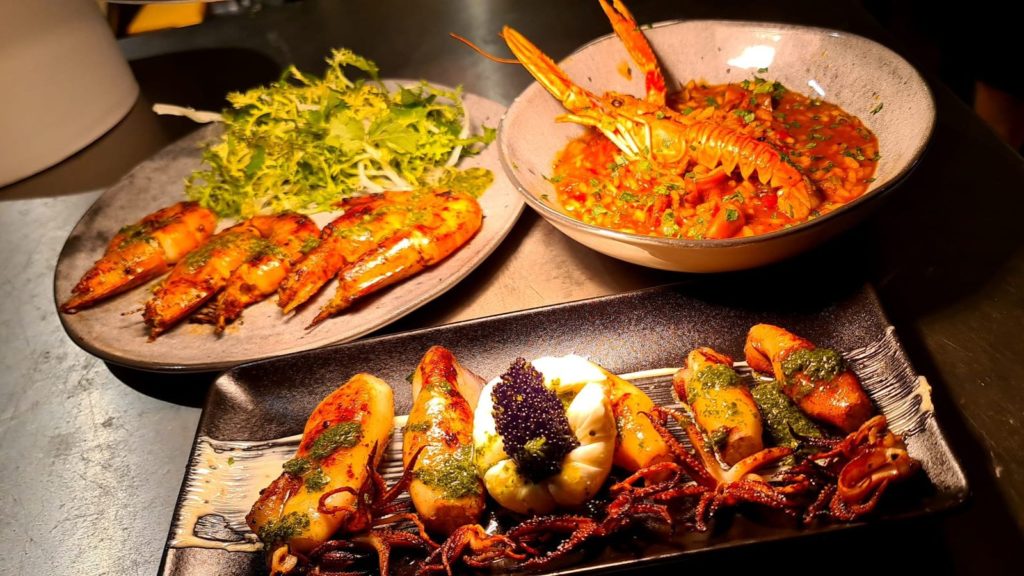
Brodecký’s concept is that “you’re buying with your eyes”. On most days the restaurant’s main offering is “anything on the grill”. Customers choose from a range of fresh fish and seafood “and we prepare it immediately for you.”
“You can sit and have a glass of wine or prosecco, or you can take it with you,” he said. Seafood Prague is also offering delivery of a larger selection of products.
The restaurant has started pre-spicing whole fish as well as octopus for customers who would like to cook seafood at home, but are not sure how.
“We cook it [octopus], we marinate it, so people can just go home and put it on the pan, and it’s done.”
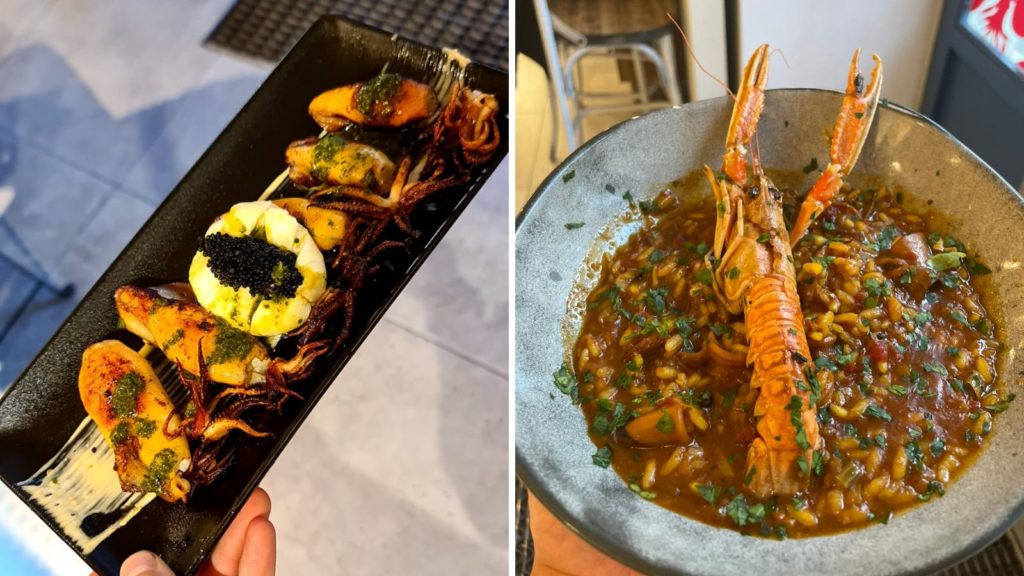
The Vinohrady restaurant is also offering a new special menu on Tuesdays and Thursdays in what Brodecký describes as more of a “fine dining, tapas style”. He recommends customers try the octopus sliders with homemade kimchi, or alternatively the Californian calamari with poached egg and tobiko.
Brodecký also recommends their “magic” fish and chips, which is available every day. The secret is the “gluten-free dough” that he said has been extremely popular.
Seafood Prague is open seven days a week from 9 am to 9 pm and can be contacted through their website or Facebook page.
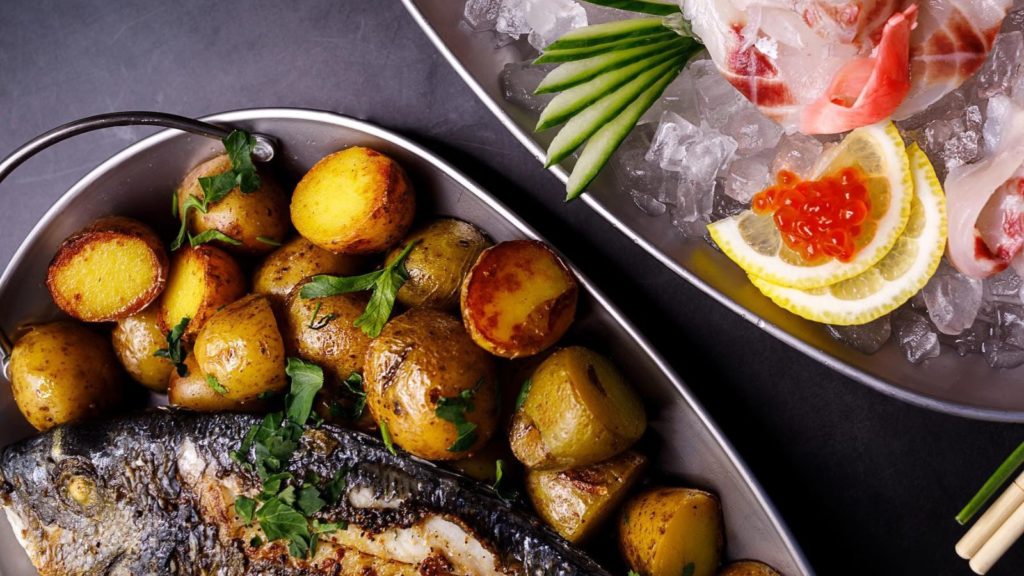
With three locations across Prague and another in Brno, American-style Waf-Waf restaurants are giving locals a chance to experiment with sweet and savoury breakfasts and lunches, offering a wide range of waffles, pancakes and crêpes.
Speaking to Prague Morning, part-owner Jonáš Basel said the “menu is full of special products that you can’t find anywhere else”.
“Restaurants in Prague only offer these products for dessert,” he said, “something you have after your main meal. We wanted to change that.”
The do-it-yourself menu on offer at Waf-Waf restaurants allows customers to pick and choose from “20 or 30 ingredients that they can mix themselves”.
Waf-Waf also have set menus for breakfast and lunch, including savoury options like their signature Wafchick chicken strip waffle sandwich, which Basel says has become “more and more popular”.
“I think we have really good savoury pancakes and waffles, so I’m not surprised people like them. They’re most popular on weekends for breakfast, but around 65 per cent of people still go for sweet alternatives,” he said.
Asked to pick a favourite item on the Waf-Waf menu, Basel said he “love[s] Waftella”.
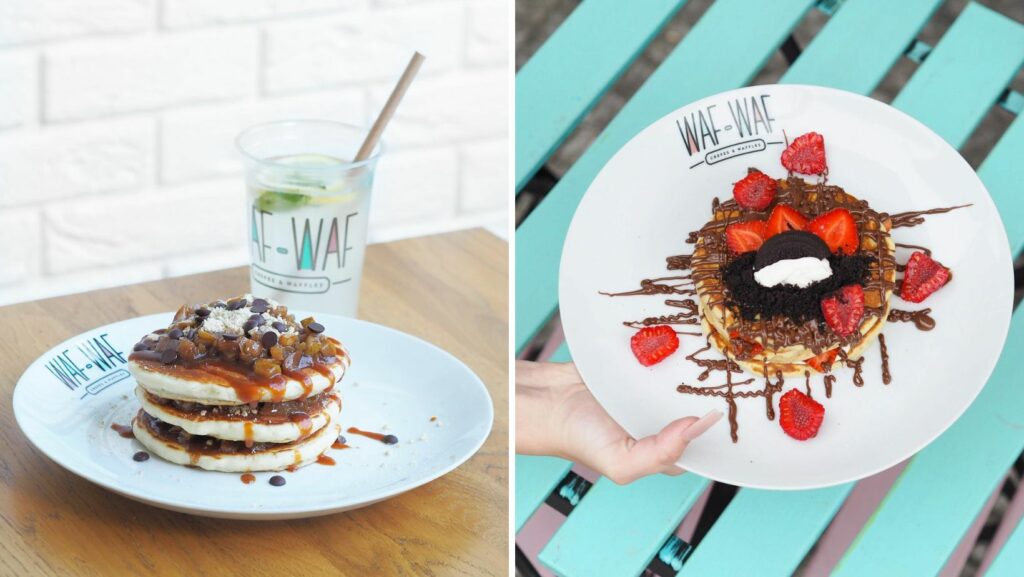
“I think it’s our best product. Sweet pancakes with Nutella, strawberries, raspberries, oreo and mascarpone.”
Waf-Waf is popular with a range of customers, Basel said, catering to families with children, birthday parties, students and even businesses.
The company survived the pandemic and has now “been running for just over 5 years.”
“Covid was tough,” he said, “but it brought us new ideas. We now deliver across the whole of Prague using Wolt, Bolt and Dame Jidlo.”
“We celebrated our five-year anniversary in April,” Basel added.
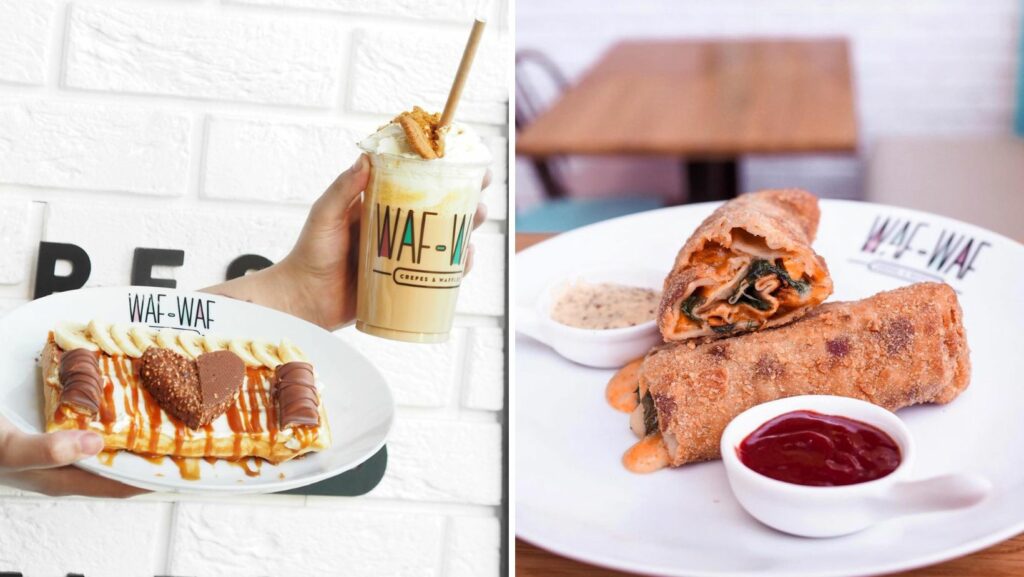
Waf-Waf have restaurants in Letna, I.P Pavlova, Palladium shopping centre and in Brno and Basel is keen to expand the business, looking for people interested in setting up franchises “in Prague or in other cities”.
The Letna and I.P Pavlova restaurants are open Monday to Sunday from 8 am to 9 pm, with Waf-Waf Palladium and the Brno location opening one hour later at 9 am.
The tenth edition of the Signal Festival of digital and creative culture returns to Prague next month, lighting up the city for four days of exhibitions, tech-based displays and performances spread over 14 locations.
The festival – which is the most visited cultural event in the Czech Republic – will take place from October 13th to 16th, featuring work from many artists including world-renowned Turkish new media artist Refik Anadol and Czech designer Maxim Velčovský.
Visitors can visit nine of the 15 exhibitions free of charge, with the remaining displays available with a Signal Plus pass currently available for 240 Kč on the festival’s website. A VIP pass allowing viewers to skip queues at all 15 locations and access food and drink catering is also being sold for 1690 Kč.
Speaking to Prague Morning, Signal Festival director Martin Pošta said the tickets are “very important to support the future of the event”.
“It’s not for profit and it’s very affordable,” he said. “It allows us to keep being creative.”
“We aren’t just promoters of art, we produce it. These works have been created especially for the festival.”
Pošta recommends visitors set aside two nights for the festival as “it’s not possible to do it all in one”. An app with an interactive map of the exhibitions is available free of charge. “Pick a starting point and make your way through,” he said.
The festival has been designed with two routes through the city – one in the centre and one through the up-and-coming Vršovice area in Prague 10, where Signal exhibitions have never been displayed before.
“We’re excited to be exploring a completely new area of the city,” Pošta said.
Included in the city route will be Refik Anadol’s large-format projection, which Pošta described as “Prague data-based art sculpture”.
Analysing large amounts of data provided by the city of Prague, Anadol has produced a “site-specific installation” that will be displayed in the Centre for Planning and Development of the Capital City of Prague (CAMP).
The exhibit will be available with Signal Plus and VIP passes.
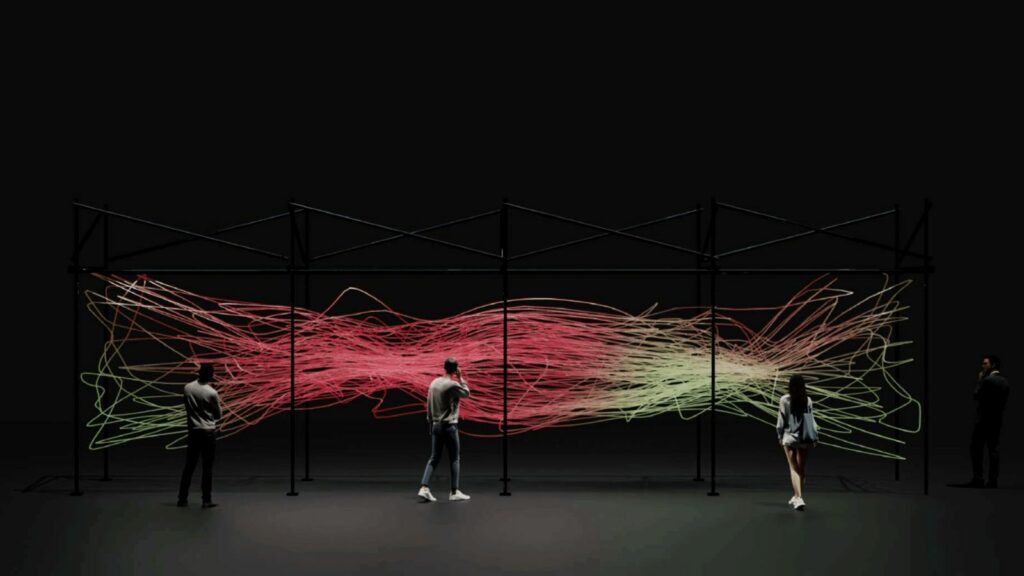
Anadol is known for his dream-like work designed using algorithms, artificial intelligence and machine learning.
Another exhibition highlighted by Pošta is Forum Robotum: a “robot safari” designed by engineers from the Czech Technical University in Prague (ČVUT) Faculty of Electrical Engineering, where visitors “will be able to interact with robots in their natural habitat”.

While Martin Charvat didn’t always know he wanted to become a chef, it was probably inevitable. The son of Jan Charvat, who has owned restaurants in Prague for over 25 years, the restaurant business is in Martin’s blood.
Now head chef at Krymská modern European restaurant Ansambl, Martin has stamped his vision on a menu where customers can have what he describes as “casual fine dining for an accessible price”.
Aged 15, Martin began working in the kitchens of his father’s restaurants. “My Dad wanted my sisters and I to get some work ethic,” Martin said, speaking to Prague Morning. “So we were sent to the restaurants to help out.”
But his parents never encouraged him to pursue cooking, often pointing out that “being a chef isn’t a good career, there are long hours, the pay isn’t great, it’s hot and dirty work and you never get to see your friends.”
“I was going to grammar school, so I wasn’t supposed to become a cook”. Martin wasn’t sure what to study. Disappointed not to get into his first-choice physiotherapy course, he ended up spending a few weeks studying agricultural science at the Czech University of Life Sciences in Suchdol.
“I didn’t enjoy the studies,” he said, so when a family friend offered him a job working in a pub in York, England, he took it.
That first kitchen job felt like a “pirate ship” to Martin. Intense, long hours spent working alongside his colleagues “bring you together” he said, “it feels almost like a cult”.
“I got drawn in immediately, I enjoyed the atmosphere and quickly I felt like I couldn’t leave it [cooking] anymore. It just hooks you.”
Soon, Martin said, he became “more interested in nicer cooking and fine dining.”
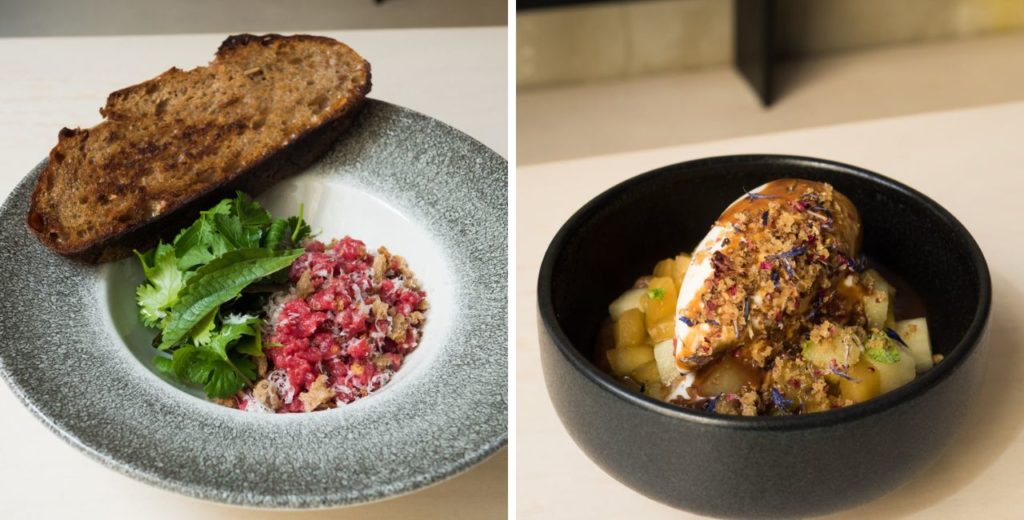
“I messaged all the fine dining restaurants in the town and one replied and offered me a week-long unpaid internship. I was very lucky because they were looking to expand their team and they offered me a job.”
Martin spent a year at the restaurant, “immersing” himself in cooking and working as part of a team. “That’s when I really got into cooking,” he said. “Small plates, very traditional French food, I loved it.”
Looking to further develop his abilities and resume, Martin then took a two-month unpaid internship in Denmark working at 2-Michelin Star restaurant Noma.
“If you told someone you were moving to Copenhagen to work 15-hour days for free, they’d probably think you were pretty stupid,” he admitted, “but it’s like a craze – lots of young people who love cooking like me go to restaurants like Noma and work for free.”
The experience taught him an attention to detail that is key to the menu he designs at Ansambl. “I am a very easygoing person,” he said, “I’m not that strict in my personal life, but the way I see it if I’m spending 12 to 15 hours in the kitchen, I want to make it count and I want to produce the best product that we can.”

Martin returned to Prague after two and a half months in Copenhagen. “I wanted to stay longer,” he said, “but working for free in Scandanavia gets expensive.” Back home, he began working at Michelin Star restaurant La Degustation where he stayed for two years.
It was there he met Ondřej Kuracina: then sous-chef at La Degustation and now his partner at Ansambl. Martin described Ondřej – a 20-year veteran of the restaurant business – as “a mentor”, who motivates him to “make their restaurant the best it can be”.
“It’s always much easier to work with people that you know, who you can bounce ideas off of,” Martin said, “because if your co-worker is someone that you feel isn’t as skilled or doesn’t care, it’s always harder to push forward.”
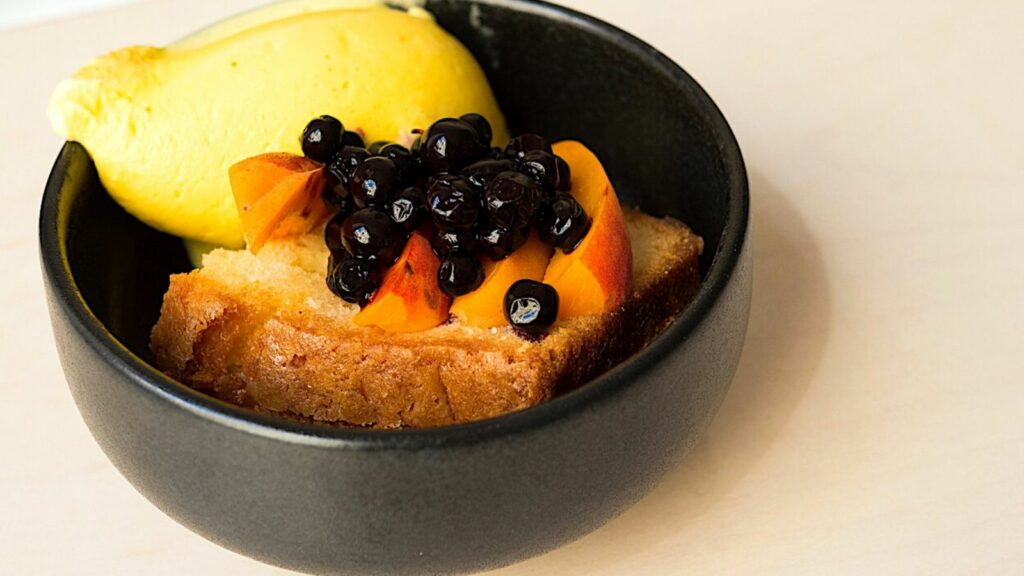
One thing that Ansambl has taken from the chefs’ Michelin Star restaurant experience is an appreciation for local and sustainable produce. Martin pointed to the short seasons in Europe – and especially in Scandanavia – where there are only a few months when vegetables grow, as a cultural reason for trying to cook seasonally. “As best we can, we try to use Czech produce and what’s in season as the basis for our menu,” he said.
“It’s quite a modern philosophy and it makes sense. Restaurants in the past tended to be very wasteful. They only used the best cuts of meat, the best parts of vegetables. Our goal is to really showcase the product with as little waste as possible.”
Ansambl are open Tuesday through Saturday from 5 to 10:30 pm as well as for lunch on Tuesdays, Wednesdays and Thursdays.
A larger-than-life figure in Prague’s entertainment sector, Frank Haughton’s three decades in the Czech Republic have gone from success to success, introducing Irish pubs to the capital and becoming a partner in one of the city’s top nightclubs: DUPLEX.
A former banker and stockbroker in Ireland, Haughton first came to Prague in 1992 to help a friend launch what is now Radio Kiss.
“While I was here,” he said, speaking to Prague Morning, “I observed the huge interest in beer and pub life and thought, okay these people already understand the concept of an Irish pub”, and moved ahead with plans for what would become the James Joyce.
Haughton has “always wanted [his pubs] to be authentic”, he said. So much so, that he bought the interior of a Belfast church, which had been bombed in the Northern Ireland Civil Conflict, and shipped it to Prague to create the James Joyce and ensure the place had the right feel.
“We bought the church pews, we bought the floorboards, we bought the front of the organ gallery, which became the front of the bar, and we shipped it all out here,” he said.
To serve authentic food and drink at the pub, Haughton would take 34-hour drives back to Ireland every six weeks, bringing back products he couldn’t find locally.
“I would have up to 800 kilos of Irish bacon, sausages and Irish black and white pudding in the car”, he said. “I was smuggling,” he conceded, “there was no permit to bring meat from Ireland into the Czech Republic.”
“It was challenging. My heartbeat always went up as I would reach the border.”
“But I always made the point of having the real stuff,” he said. “I used to bring Irish cheddar cheese, Irish potato crisps and even Irish chocolate in the beginning. I would bring anything that I thought people might want.”
Originally imagining an Irish pub would attract attention from the large German, beer-loving, community in Prague at the time, Haughton quickly found that it was instead English-speaking foreigners who quickly took to the place.
“People were looking for a place they could speak English,” he said, adding that foreign businessmen became the core of the pub’s visitors.
“James Joyce became known as the place to go if you wanted to start a business. If you went and chatted around, you were likely to meet somebody who would be able to give you some useful information.”
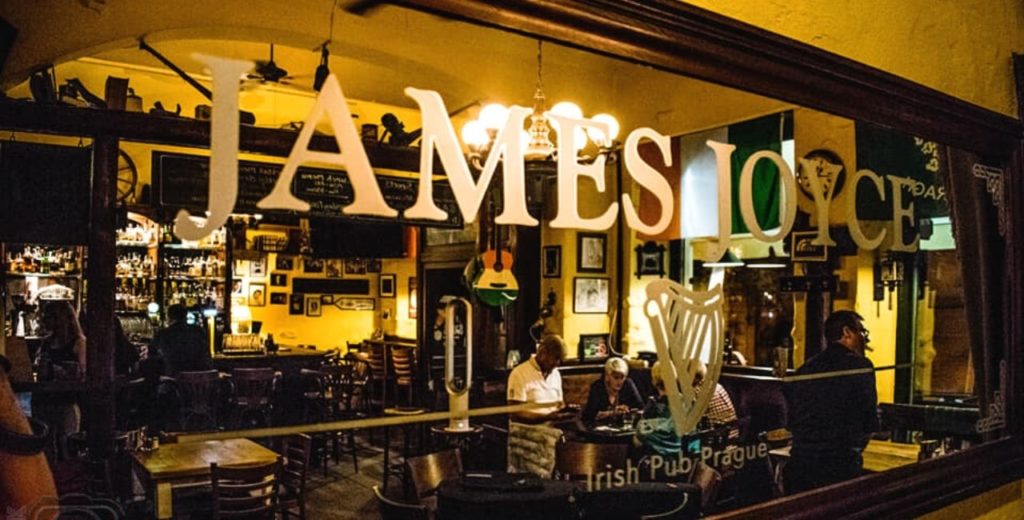
Photo: James Joyce on Facebook
The pub business was also not something Haughton had planned to stay in. “I thought maybe I’ll build this up for two years myself, and then move on to do something else,” he said.
It was the people he met every day working at the pub that convinced him to stay, though. “In all of my banking life,” he said, “I was mainly dealing with customers over the telephone, so I really enjoyed the people I met face to face.”
“It gave me great satisfaction to see people having a good time and to see a good atmosphere in the pub. I found that gave me real gratification, real satisfaction.”
Since those early days, Haughton went on to own six Irish pubs in Prague, before he sold them all to a group of buyers in 2015.
After a period of brief retirement, though, he said he “started to feel itchy” without businesses to run. “I just couldn’t sit at home so I was going out during the day and pretending I was busy.”
“But I knew I was lying to my wife and myself,” he joked.
Haughton decided to reenter the Irish pub fray, opening McCarthy’s with Conchur de Barra in 2017 before deciding to go in with de Barra and Sean Curran to buy DUPLEX, the exclusive Wenceslas Square location, which was recently ranked among the top 100 nightclubs worldwide by DJ Mag.
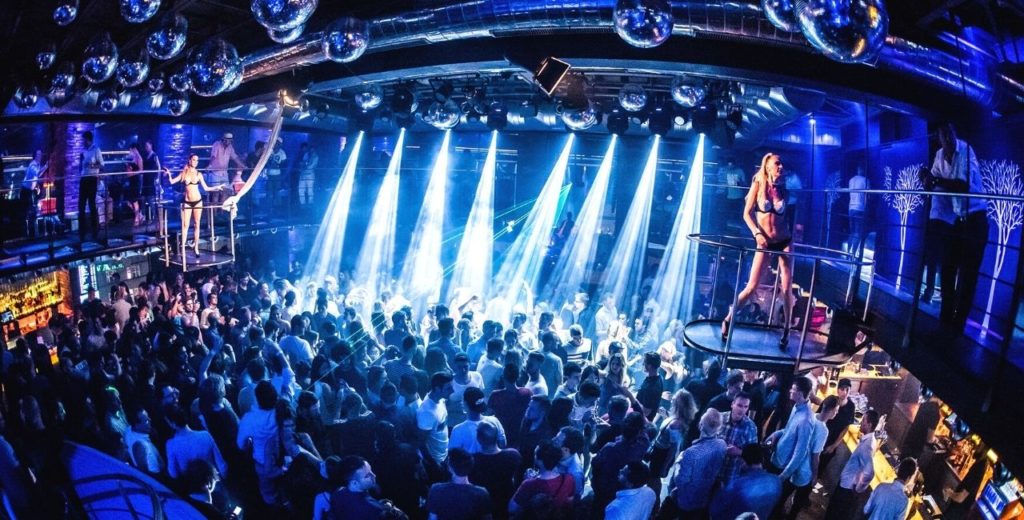
Photo: DUPLEX on Facebook
Calling it “the best atmospheric club in Prague,” he said that “it’s gone from strength to strength,” adding: “It still excites us, it still provides a huge challenge.”
“There are very few clubs worldwide that have the rooftop view that we have. Music is one factor and ambience is another, but everything [at Duplex] combines to people having a great time,” he said.
At 75, Haughton is no longer “a nightlife person”, he said, meaning the day-to-day running of the club is performed by the younger de Barra and Curran as well as by “our fantastic general manager Peter Fisher and his team”.
Haughton’s latest venture is a Staré Město Mexican bar called Tek’ila Tek’ila. “A Mexican Latino bar has certain parallels with an Irish bar,” he said. “It’s all about fun. It’s all about communication. It’s all about the staff.”
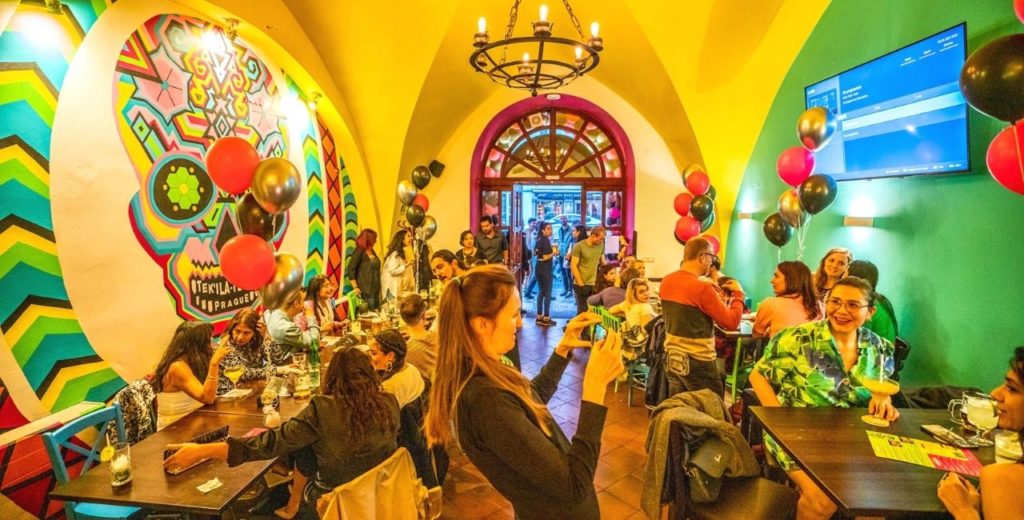
Photo: Tek’ila Tek’ila on Facebook
“We don’t really want to be a restaurant,” he added. “We want to have very good food, but we want the fun factor, the dance, the music, the Latino vibe,” to be maintained.
“We want to keep a certain authenticity on the Mexican side. We want people to come here on a Thursday, Friday or Saturday night and eat, have a good time, and then go downstairs and dance.”
Cocktails are one of Tek’ila Tek’ila’s specialities. “I’m not a cocktail person normally,” he said, “but every time I come here, I have a classic Margarita and it is fantastic.”
“Our classic South American cocktails are really, really good,” he added.
Haughton does not rule out opening more Mexican bars in Prague. “Never say never,” he said. “The first two months here have been very encouraging, we like the vibe that’s been created.”
“Maybe there’s room for Tek’ila Tek’ila two or three or four, maybe not. We’ll see,” he said.
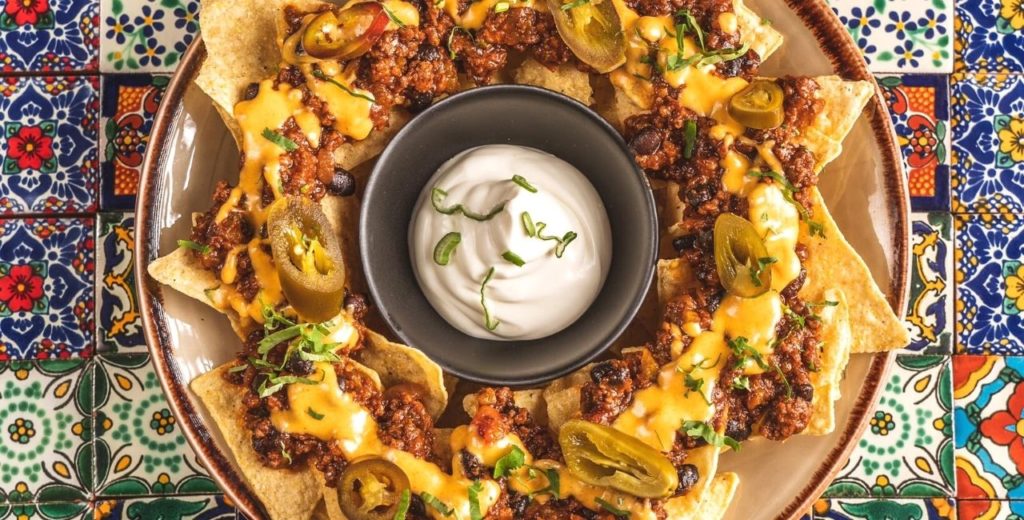
Photo: Tek’ila Tek’ila on Facebook
New to Prague’s culinary scene, Ansambl aims to provide affordable fine dining in a casual atmosphere.
Located on Krymská street in Prague 10, the cosy modern European restaurant has quickly gained popularity since opening at the end of 2021.
“We want to be approachable,” said Head Chef Martin Charvat speaking to Prague Morning, “at Ansambl everyone can try high-level food for friendly prices”.
“We want our quality to always be 100 percent,” he said, “but we want the place to feel really casual”. “The concept of the restaurant is to create small plates for dinner, so the customers can try a little more.”
Quality produce provides the basis for the restaurant’s offering and Charvat says the key is to allow the product to shine. His philosophy is to “start with perfect products and just don’t f*ck it up,” he said.
Locally sourced produce is also essential for Ansambl. “We try to only work with Czech farmers,” he said, and “try to be as seasonal and sustainable as we can”.
The dishes on offer range from variations of traditional French and Italian to Czech cuisine.
“Produce always comes first”, he said, meaning that sourcing meat and vegetables from the country’s top farmers is a priority. “Our mother company is the Bad Flash bar, so we try to incorporate as much beer into the food as we can,” he added.
“It’s very common to use wine, so we’re trying to use beer instead to design very refined dishes.”
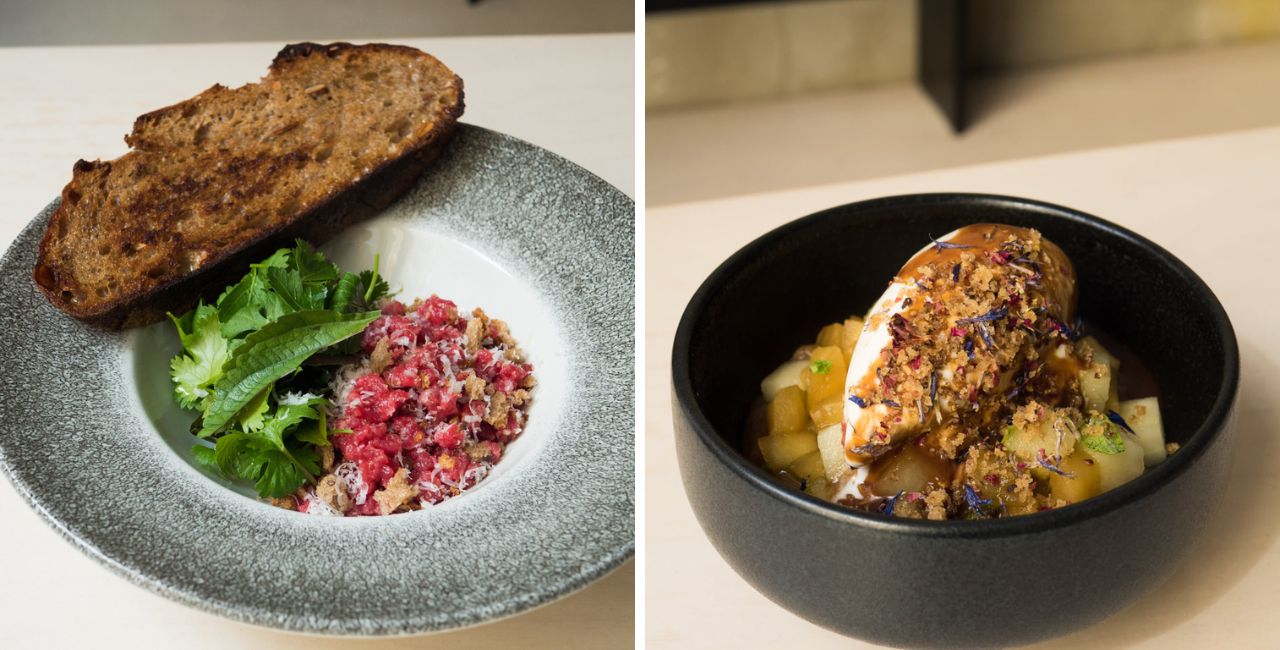
A variety of craft beers and natural wines are available to customers at Ansambl.
Another example of allowing high-quality produce to speak for itself, natural wines are an element Charvat is particularly excited to integrate into the restaurant’s dining experience.
The idea of natural wines as “wild and unapproachable” is not accurate, he said. Instead, Charvat describes the wines on offer at Ansambl as “really fresh, with no unnecessary chemical additives”.
“And they go really well with the food,” he said.
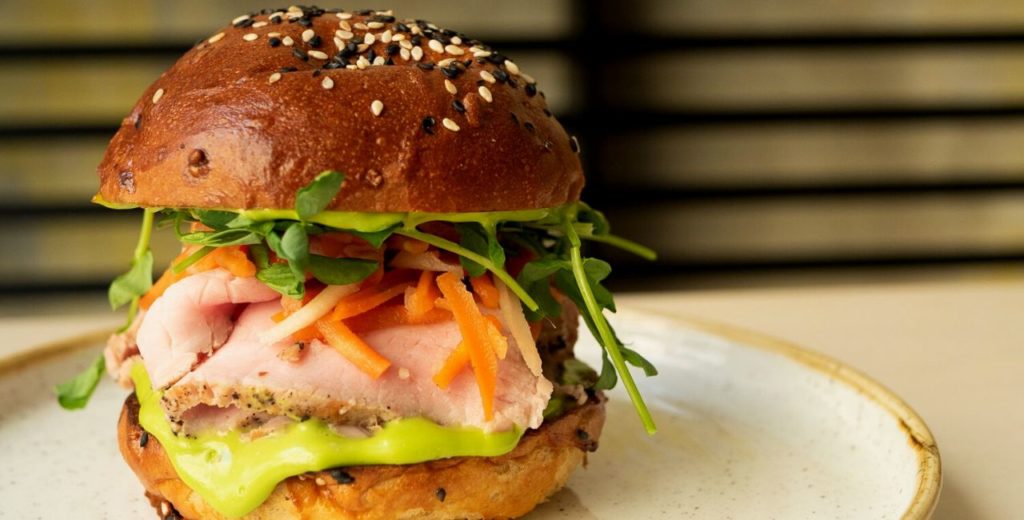
This weekend brings the 2022 Snapbacks Liga semifinals, and with it, a chance at glory for the Czech Republic’s original American football team, the Prague Lions.
Hosted at Sparta Rugby at UNYP Arena, the hotly-anticipated game sees the Lions take on Přerov Mammoths at 4 pm on Saturday, July 2nd.
The pandemic hit the American football scene in the Czech Republic hard, forcing the game to grind to a halt and hurting years of hard-fought wins for a sport that has seen huge growth over the last 20 years.
For Lions Head Coach and part-owner Zach Harrod, though, this semifinal is like any other game.
Speaking to Prague Morning, he said: “Before the season we set goals for ourselves. This semifinal is another goal and another opportunity to be 1-0 next week.”
“It doesn’t sound sexy, but that is how we look at it.”
The son of a high school American football coach in Wisconsin, he first arrived in the Czech Republic for a 5-week training camp back in 2002.
“If somebody would have said that that first summer in 2002 would turn into nearly two decades, I wouldn’t have believed them,” Harrod said.
“I thought I’d do other things, I thought I’d go elsewhere,” he said, but quoting Franz Kafka, “Prague never lets you go, this dear little mother has sharp claws”.
After a period back home, Harrod said some soul-searching and asked “What am I good at? What am I made for?” led him to return to the Czech Republic for what was initially a two-year internship.
Playing and coaching at the Lions, and working with the Christian organisation Converge, he found a way to stay in the country doing what he loves.
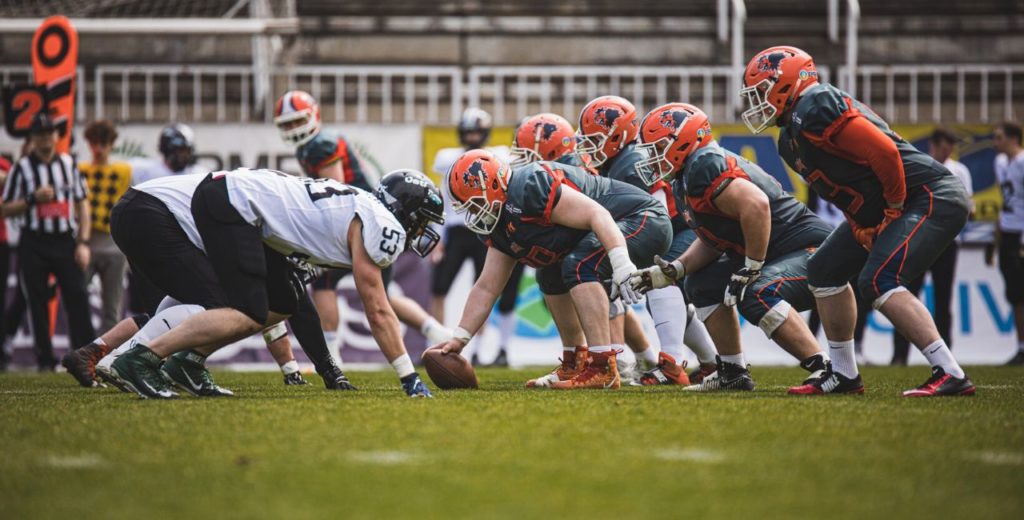
When it comes to football, Harrod joked he “really didn’t have a choice. Just like my boys don’t have a choice”.
“There’s a picture of me when I was six months old, wearing a little football helmet and jersey,” he said.
A religious studies major, Harrod is now the pastor of a small church. Whether it be in his missionary or coaching work, his goal is to “build better citizens”.
“I want to have better men as a result of them being in the program,” he said. “I see the sport [American football] as the best team sport in the world to see life change happen, and to see men that are gonna be great dads, great citizens and great leaders.”
And while operating in the capital means “more competition for everything”, Harrod believes being in the biggest city in the Czech Republic means he can have “the deepest impact on the country”.
After going in with some friends following the 2018 season to buy the Prague Lions logo and brand, he could not believe how quickly success seemed to follow.
Winning the league in 2019, following a 13-year trophy “drought”, victory in his first year of ownership meant players and sponsors alike were taking notice. “In 2020, we had over 100 kids involved in our program,” he said, “which was huge”.
Coverage of the Lions’ 2019 win saw Harrod appear in newspapers in several cities back in the States.
“People from Briggs and Stratton [owner of the Lions’ sponsor Vanguard] opened the paper and saw an American coach and American football in the Czech Republic, wearing their logo.”
“It was great for us,” he said. “We had our whole budget for the adult 2020 season covered.”
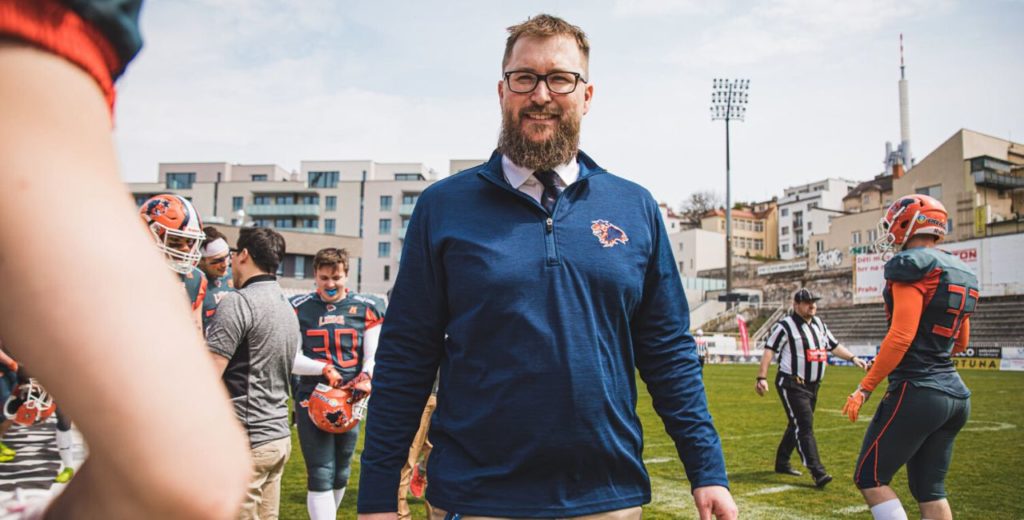
But the Covid-19 pandemic left those plans in tatters. The cancellation of the senior, junior and youth leagues and the inability to train or host events left little means of keeping players or sponsors engaged.
In what was by Harrod’s own admission a “super hard time”, he “tried so many different things to keep kids connected with us”.
Despite Zoom quizzes, video coaching, one-on-one tactical sessions and more, the Lions “lost more than 40 kids because of Covid,” who seemed to “lose interest in pretty much anything”, he said.
Even as the country and the world return to normal, Harrod reports difficulties finding kids and teenagers to play American football.
“It’s harder than ever to recruit new kids,” he said, “but I know we just have to keep trying and keep pushing. And hopefully, we keep building that youth program. We just need kids in a bad way.”
Hip hop music is one surprising tool that Harrod says provides hope to the sport in Prague. Kids’ love of the music helps to “connect them with American culture”, he said, “I think we need to embrace that a little bit more sometimes.”
Long-term, Harrod hopes to secure a permanent home for the Prague Lions and to become “one of the top [American football] programmes in all of Europe”.
“I don’t know if it’s going to be one relationship or five relationships,” he said, “that takes us to that higher level.”
“We’re close,” he added, “but close is only good in games like horseshoes and hand grenades.”
This Saturday’s game represents an opportunity for the Lions to move in the right direction. Tickets for the semifinal at the UNYP Arena are priced at 120 CZK and are available on Ticketportal.cz.
Not your typical Argentinian steakhouse, Gran Fierro puts sustainability at the core of its identity.
“We know the idea of the steakhouse needs to evolve,” said owner Juan Cruz, speaking to Prague Morning.
“We are not the typical steakhouse where people get stuffed with meat like crazy,” he said. Since they moved to the new location in Myslíkova, they’ve been taking steps towards sustainability, like composting their organic waste, creating awareness about the deforestation caused by the charcoal industry, and many more circular initiatives.
Now it seems that the time has come for the introduction of natural wines on the menu. “I was skeptical about natural wines since I heard about them, and even more after trying some very forgettable ones,” Juan said.
“But then I met the sommelier and winemaker Igor Corral Carmona. He introduced me to some remarkable wines that made me change my
mind. When you discover that a wine made without chemicals is not only good but great, you don’t want to drink anything else”.
Juan says that the degustation with Igor is unique, not only because he shares his knowledge with an absolute passion, but also because “he makes you understand what you are drinking. Suddenly it all makes sense”
One type of natural wine that he is keen to introduce it’s the often labeled orange wines. They are not made from oranges as some people might think. These wines are made from white grapes but keeping the skins during fermentation, as it is done for red wines. That’s what gives them the darker color.
“Most orange wines production involves little intervention, making them fall on the natural wine spectrum, and that’s why we consider them emblematic”
Juan also explained that natural wines are helping the larger wine community to understand more and more that it’s not so much about the grape as it is about the terroir. “The fewer chemicals you put in there, the more you let the terroir express its character”
The local scene of natural wines in the Czech Republic is starting to boom and Gran Fierro wants to spice it up by introducing some wines from Spain and France that deserve to be tasted.
Gran Fierro is hosting a degustation of Natural wines & Tapas at Manifesto Market Anděl on Friday, July 8th from 18:00 to 21:30 –, where Igor it’s going to show why the natural wines are so versatile when pairing them with food.
And on Sunday, July 10th from 11:00 to 15:00, Gran Fierro will offer a Natural Cava & Jamón brunch, where Igor it’s going to cut a whole “Pata de Jamón Ibérico de Bellota” and it’s going to pair its 3 different parts with 3 different Cavas.
